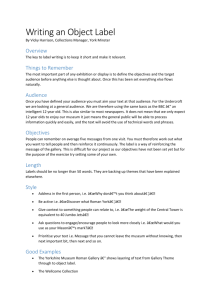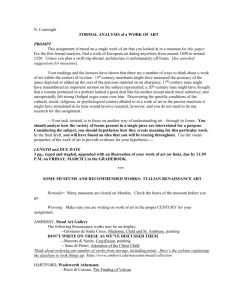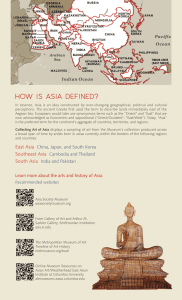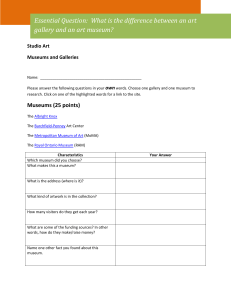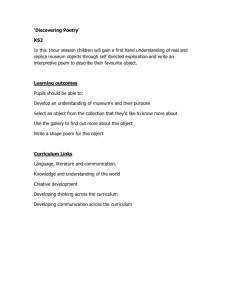University College London Programme Specification MA MUSEUMS & GALLERIES IN EDUCATION
advertisement
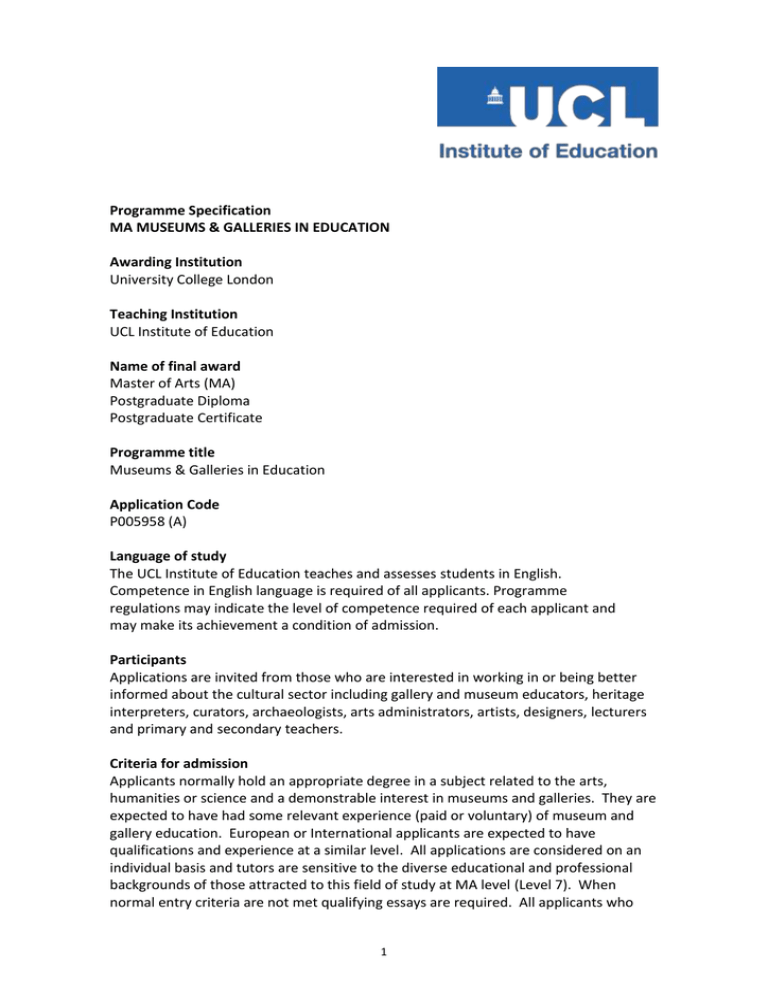
Programme Specification MA MUSEUMS & GALLERIES IN EDUCATION Awarding Institution University College London Teaching Institution UCL Institute of Education Name of final award Master of Arts (MA) Postgraduate Diploma Postgraduate Certificate Programme title Museums & Galleries in Education Application Code P005958 (A) Language of study The UCL Institute of Education teaches and assesses students in English. Competence in English language is required of all applicants. Programme regulations may indicate the level of competence required of each applicant and may make its achievement a condition of admission. Participants Applications are invited from those who are interested in working in or being better informed about the cultural sector including gallery and museum educators, heritage interpreters, curators, archaeologists, arts administrators, artists, designers, lecturers and primary and secondary teachers. Criteria for admission Applicants normally hold an appropriate degree in a subject related to the arts, humanities or science and a demonstrable interest in museums and galleries. They are expected to have had some relevant experience (paid or voluntary) of museum and gallery education. European or International applicants are expected to have qualifications and experience at a similar level. All applications are considered on an individual basis and tutors are sensitive to the diverse educational and professional backgrounds of those attracted to this field of study at MA level (Level 7). When normal entry criteria are not met qualifying essays are required. All applicants who 1 meet the entry criteria are interviewed by the programme leader or a senior member of the programme team. Interviews provide an opportunity for applicants to experience the unique context for the study of museum and gallery education at the UCL Institute of Education: a long established international centre for teaching and research in museum and gallery and art and design education. Alternative arrangements are made via SKYPE or telephone for those unable to attend a face-toface interview. Applicants whose first language is a language other than English may be required to provide evidence of their English language proficiency. UCL Institute of Education welcomes applications from participants with disabilities and is committed to providing support for students with a range of conditions which have a long-term and adverse effect on studying such as: • • • • • • sensory (visual/hearing/speech) impairments mental health issues mobility or dexterity impairments Asperger's Syndrome or other autistic spectrum disorders chronic medical conditions (e.g. diabetes, epilepsy, H.I.V.) specific learning difficulties (e.g. dyslexia, dyspraxia) Disability and Wellbeing Support will also advise people who have a temporary mobility/dexterity impairment/other difficulty as a result of an accident, injury, illness or surgery. Every person is treated as an individual, and we invite you to contact us as early as possible so that we can consider your needs and tailor our support to meet them. This applies to all students – home, EU and international. Educational aims of the programme This programme enables participants to: • • • • • • • combine academic study with professional educational practice in museums; critically explore influential contemporary and historic theories in museum and gallery education; experience object based learning (OBL) in museum, gallery and archive collections as a basis for curriculum and personal development; interpret heritage sites, for example, gardens, industrial sites and historic buildings in a local and global context; increase understanding of historic and cultural influences on collections; articulate a rigorous argument for ‘learning through culture’; understand the impact of social networking and digital technology on learning in the cultural sector. Learning Outcomes: Knowledge and understanding; skills and other attributes On successful completion of the programme participants should be able to: • demonstrate an ability to critically analyse their own museum and gallery experience and educational issues in professional practice and make creative 2 connections with the work of key contemporary thinkers in museology and museum and gallery education; • draw upon different theoretical and professional perspectives to support a sustained and academically rigorous argument in relation to practices, materials and issues in the field of museum and gallery education; • demonstrate knowledge and understanding through an ability to articulate a range of ideas in four key dimensions of museum and gallery education: institutions, audiences, collections, learning and teaching. Contribute to research in the cultural sector on a timely subject Mode of study The programme is offered within the UCL Institute of Education’s 180 credit MA scheme. It is offered on both a part-time (two years) and a full-time (one year) basis and evening and day blocks enable flexible access to a range of historic and contemporary sites. Entry is only possible in October or January of each academic year. Programme structures and requirements, levels, modules, credits and awards The UCL Institute of Education uses the European Credit Transfer and Accumulation System (ECTS), as a guide to support periods of study undertaken abroad and to assist student mobility. Currently it is assumed that two UK credits equate to one ECTS. Therefore a module of 30 credits would typically equate to 15 ECTS credits. Participants who for academic or personal reasons are unable to successfully complete the 180 credits required for the masters award may exit with the completion of 60 or 120 credits respectively and be awarded a Postgraduate Certificate or Postgraduate Diploma in the subject area. The programme comprises a combination of required and recommended modules with the possibility of students being able to import a maximum of 60 PGCE ‘M’ level credits from, e.g. Post-Compulsory, Primary and Secondary. Taught sessions take a variety of forms and include lectures, seminars, workshops, visual presentations and visits to museums and galleries. Teaching is undertaken by UCL Institute of Education staff and visiting lecturers and a substantial part of the programme involves off site teaching in museums, galleries and heritage sites. Term Autumn Autumn Title of Module Attendance Assessment Credits Issues in Museum Studies Tuesdays – Variable attendance (evenings, halfdays + whole days) 5,000 word assignment 30 Thursdays – Variable attendance (evenings, half- 5,000 word assignment OR 3,000 word assignment plus a digital device such Constructing & Interpreting Heritage Culture 3 REQUIRED MODULE 30 days + whole days) as an app (2,000 word equivalent) RECOMMENDED MODULE * Autumn** Contemporary Art & Artists in Education Thursdays Variable attendance (evenings, halfdays + whole days) 4 5,000 word assignment 30 RECOMMENDED MODULE * Term Spring Spring Title of Module Attendance Assessment Credits Responsive Museums & Galleries: inclusion and outreach in practice Tuesdays – Variable attendance (evenings, halfdays + whole days) 5,000 word assignment 30 Wednesdays – Variable attendance (evenings, halfdays + whole days) 5,000-word assignment OR: Create an interpretative tool around a single object or artwork + a 2-3,000-word written rationale Material and Virtual Cultures: transforming the museum and gallery experience REQUIRED MODULE 30 RECOMMENDED MODULE * Summer** Alternative Models for Art Education 6 x Wednesdays, 5.00-8.00 2 x days during summer halfterm, 10.00-6.00 1,000-word proposal for an alt educational model linked to a specific context that is relevant to students’ practice accompanied by a 4,000-word rationale 30 RECOMMENDED MODULE * Summer Summer Report (Part-time participants) 8 x Tuesdays, 5.30-8.30 1 x Tuesday, 10.00-6.00 10,000 word Report 30 Dissertation: Work Placement Route (Full-time participants) 8 x Tuesdays, 5.30-8.30 1 x Tuesday, 10.00-6.00 2 x half-days, 10.00-1.00 Plus: c.20 days museum-based research 14,000 word 60 dissertation plus a work placement project/portfolio (6,000 word equivalent) REQUIRED MODULE FOR FT REQUIRED MODULE FOR PT * NB: MA M&G full-time students are able to choose 2 of these 4 recommended modules. MA M&G part-time students are able to choose 3 of these 4 recommended modules. ** The close relationship between the MA Museums & Galleries in Education and the MA Art & Design in Education enables Museum and Gallery students to benefit both from the opportunity to follow shared (recommended) modules across the 5 programmes and from involvement with a wider network of artists, craftspeople and designers working in education. Teaching, learning and assessment strategies to enable outcomes to be achieved and demonstrated This programme is rooted in a strong tradition of collaborative teaching and research projects involving programme tutors and museum and gallery professionals. The MA Museums & Galleries in Education is taught by UCL Institute of Education staff and draws upon the expertise of members of education departments at many museums including the British Museum, Victoria & Albert Museum, Science Museum and Tate Modern and Tate Britain, Kensington Palace and the Museum of London. In addition individual sessions involve members of education staff from a variety of smaller, specialist venues that represent historic and natural history collections as well as those in the art, craft, design continuum with an emphasis on contemporary work (e.g. Design Museum, Whitechapel Art Gallery, Grant Museum of Zoology, Petrie Collection of Egyptian Archaeology). Participants with a wide range of interests, experience and educational backgrounds are attracted to this programme and this is seen as a particular strength. Typically the student body includes primary and secondary teachers, college lecturers, museum and gallery education officers, arts administrators, community arts workers, artists in education, university academics and administrators. Each module provides a clear organisational structure within which individuals are encouraged to critically reflect upon their professional practice in a context of growing understanding of key dimensions of museum and gallery education. Each module engages participants in a variety of learning experiences (e.g. individual tutorials, peer teaching and learning, seminars, lectures, student presentations). Gallery and museum-based whole day sessions and visits form a central part of this programme to capitalise upon permanent collections and changing exhibitions that are available as an unparalleled resource for learning in central London. We also visit sites outside London particularly during the Heritage module. Assessment is based on coursework assignments and a Report (part-time participants) or a Dissertation: Work Placement (full-time participants) that encourages innovative relationships between theory and practice to be explored in relation to a wide range of topics. Tutorial support for module assignments, the Report and the Dissertation are timetabled for each module and students are allocated appropriate tutors for this purpose. In addition each student is allocated a personal tutor, to have an overview of their work and needs each academic year. Work Placement (approximately 20 days) normally takes place in the summer term. Students are required to conduct a piece of research during their placements in negotiation with course tutors and their host institution. Information about assessment regulations Participants must successfully complete all elements of the programme, to achieve the minimum 180 credits required for the award of an MA. All coursework is assessed according to the grade-related criteria for the programme level, found in the student handbook. 6 All assignments are independently marked by two staff members, who meet to discuss and reconcile the marks and comments for each individual. Assignments are graded from A to D, with D being a failing grade. Participants who fail an assignment may be re-assessed in that element of their programme of study on one further occasion only, within the deadline specified by the Programme Leader. An external examiner is appointed and plays an important role in monitoring the quality of the programme and evaluating the effectiveness of the teaching and support provided for the programme participants and the reliability of the judgements made in assessing them. Further details about assessment regulations can be found on the UCL website. Support for learning Strategies used to support participants’ learning acknowledge the demands of parttime study and the breadth of professional experience, expertise and interests participants bring to the programme. Support includes: • • • • • • • • • • • • Induction sessions – to include a joint social gathering with MA Art & Design in Education participants and tutors; Module Handbooks; Programme Handbook (Notes of Guidance for Students and Staff); Whole programme Bibliography; The programme leader is available to advise all participants on academic matters and to refer them to the range of support services available at the IoE including Student Support Services, the Academic Writing Centre, online induction on the use of the library and VLE; Specialist resources available within Art, Design & Museology (e.g. visual material – photographic darkroom and computing facilities, access to technicians and resources officer; Access to national and international network of museum and gallery education staff; Access to museum and gallery conferences, teachers’ evenings and private views; Access to activities and services provided by professional bodies, e.g engage, GEM; Access to research projects in the fields of museums and galleries and art and design education; Critical and supportive written/oral feedback on draft sections of assignments/ reports/dissertations and submitted coursework/reports; Access to the full range of welfare and union facilities is afforded to all UCL Institute of Education students. Methods for evaluating and improving the programme • • Module evaluation by participants; Termly meetings of the MA Museums & Galleries Programme Committee including student representation; 7 • • • • • • Annual programme review prepared by programme team and considered by Teaching and Quality Committee; Periodic programme review and revalidation involving external panel member; Staff Review and development; External examiner reports; Structured professional development for teaching teams; National student surveys. Committees with responsibility for monitoring and evaluating quality and standards: • • • • MA Museums & Galleries programme committee; Board of Examiners; Teaching and Quality Committee; Validation and Partnership Panels. Mechanisms for gaining participant feedback on the quality of teaching and their learning experience: • • Participant module evaluation (sessional and programme); Student representation on MA Museums & Galleries programme committee. Staff development priorities include: • • • • Staff appraisal and institutional staff development courses including the development of skills in relation to new teaching resources; Dissemination of research projects concerned with teaching; Staff development related to internal post-Subject Review action plan, the Human Resources Strategy and the revised Learning and Teaching Strategy; Dissemination of innovative practice within the Department and across the Faculty through workshops, peer observation, seminars and articles. Indicators of quality and standards • • • • • A large number of former participants have become highly successful education officers in a wide range of museums and galleries in the UK and beyond. (Others have gained promotion in organisations that include Arts Council, English Heritage and the National Lottery.); Former participants are currently registered for doctoral research and others have had material published; The involvement of UCL Institute of Education staff in this programme has influenced the nature of their research and has been a major factor in the attraction of external funding for research projects (e.g. Morgan Stanley/DfES/AHRB and collaborative research with the Tate, V&A, the Whitechapel and the Museum of London); Successive visiting examiners’ reports draw attention to the innovative nature and quality of this programme; The programme is promoted by the two professional associations for museum and gallery educators: engage and GEM; 8 • The programme offers a range of placements that take place in museums, heritage sites and art galleries both in and out of the capital but including Pitt Rivers, Oxford, the Jewish Museum, Camden, London Zoo and Covent Garden Opera House. Relevant benchmark statements and other external and internal reference points used to inform programme outcomes Masters degrees are awarded to participants who are able to demonstrate: • • • a breadth of knowledge and understanding of contemporary issues related to collections, audiences, cultural institutions and ways of learning and teaching; a critical awareness of the changing nature of museums and galleries to their audiences informed by relevant theory and research; a capacity to make creative connections between personal experience of learning in museums and galleries and professional practice in education. The external examiner is appointed for a period of four years by the Chair of the Teaching & Quality Committee. The external examiner is a prominent university academic in the field of museums and gallery education. The role is that of moderator: • • • approving examination procedures; reviewing coursework; attending the final examination board meeting. Traditionally the external examiner has contributed to the development of the programme through informal on-going dialogue with members of the programme team and students as modules have evolved to meet the changing needs of participants and gallery and museum professionals. Date of completion/amendment of specification 14 August 2015. 9
